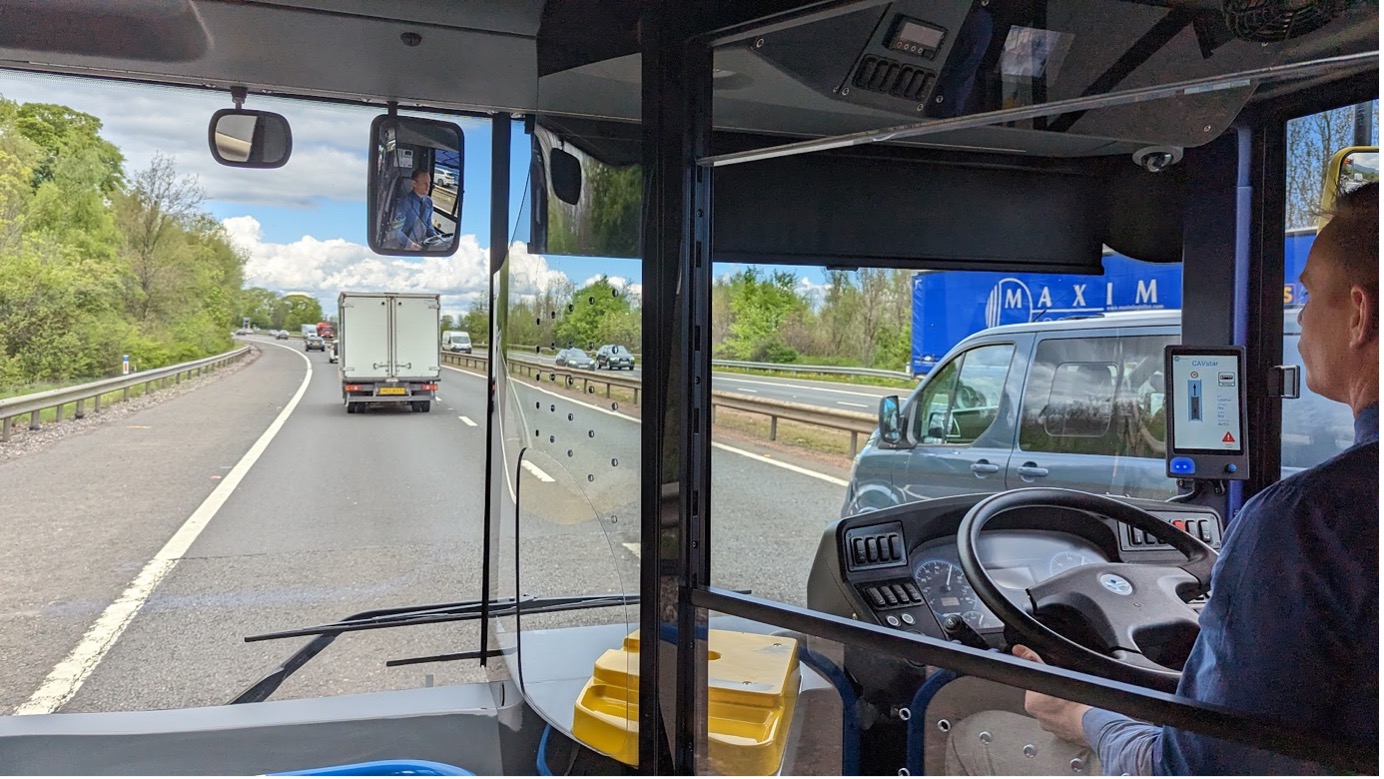All aboard the world’s first autonomous bus service
Operating across Scotland’s Forth Road Bridge, the Stagecoach bus will transport around 10,000 people per week. Last week our Automated Mobility Lead, Anthony Gallego, was invited to the formal launch: he describes the experience here.
Today, the world’s first autonomous bus service picked up its first passengers. Operating across Scotland’s Forth Road Bridge, the Stagecoach bus will transport around 10,000 people per week across its 14-mile route.
Last week our Automated Mobility Lead, Anthony Gallego, was invited to the formal launch of the autonomous bus and got the opportunity to take a trip. Here Anthony describes the experience and what it means for the development of automated vehicles in the UK.
Visit Stagecoach’s website to find out more.
This is how Anthony describes the experience: “When the vehicle started to run autonomously, there was no sudden change in driving behaviour; the automated lane changes, merging into traffic, speed adjustments, and managing different road types happened without any sense of risk or danger. When the vehicle handed over control to the driver for areas outside its autonomous operating domain, the transition was seamless and carried out by professional drivers trained to operate this Level 4 Autonomous Bus.”
The CAVForth bus will gather data for six months on how passengers interact with and respond to autonomous vehicles. The project will help identify potential improvement areas and ensure that future autonomous vehicle services are designed with passenger safety, comfort, and convenience in mind. It will also provide an opportunity to test the autonomous drive systems in real-world and under various driving conditions.
The CAVForth project demonstrates how far Autonomous Driving Systems have progressed and the value of the Government and Industry working together in collaborative R & D projects to enable these pilots to become a reality. Alongside other developments such as, ServCity, and MultiCAV, the UK continues to retain global leadership positions in Connected and Automated Mobility.
The CAVForth project, launched in response to a 2018 competition, Connected and autonomous vehicles 4: piloting passenger services (CAV4), aimed to demonstrate UK autonomous vehicle capabilities and technologies on a large scale, suitable for testing public acceptance, business models, and viability. In fact, in the recent funding competition Commercialising Connected and Automated Mobility: Deployments and building on the success of this pilot project, CAVForth2 has been awarded £5.2 million CCAV and Innovate UK, matched by industry to a total of £10.4 million. This project will allow Stagecoach to build upon this service and launch what is believed to be the world’s most complex full-sized automated bus service, extending the route to Dunfermline bus station and including a new Alexander Dennis EV Bus. This project will test and refine the commercial service model, from the current ‘Captained’ service, with a staff member onboard, to future deployments with smaller vehicles which could operate with no staff on board.
Other funded programmes include:
- V-CAL – North East Automotive Alliance – £8 million to roll out self-driving and remotely piloted HGVs between the Vantec and Nissan sites in Sunderland
- Hub2Hub – HVS – £13.2 million to develop a new, zero emissions, self-driving HGV with Asda
- Sunderland Advanced Mobility Shuttle – City of Sunderland Council – £6 million to build and trial a self-driving shuttle service to the University of Sunderland and the Sunderland Royal Hospital
- Project Harlander – Belfast Harbour – £11 million to deploy a self-driving shuttle service around Belfast Harbour
- Multi-Area Connected Automated Mobility – Conigital – £15.2 million to establish a remote driving control hub, to oversee self-driving vehicles operating in Solihull and Coventry, with the NEC and local councils.
- Project Cambridge Connector – Greater Cambridge Partnership – £17.4 million to trial on-demand, self-driving taxis, to complement existing transport services in parts of Cambridge
The future of automated vehicles looks promising as new technologies are demonstrated with the potential to offer new mobility services, in line with the Government’s 2025 Transport Vision for CAM. We will begin to see the deployment of self-driving vehicles to help improve the way in which people move and create the market for early commercialisation of the technologies.
The UK is also enabling a comprehensive regulatory, legislative and safety framework, that will be used by CAM innovators and transport operators in the UK to deliver sustainable, safe, accessible, and inclusive mobility solutions.

Jim Hutchinson, CEO of Fusion Technologies, the lead partner for this project providing the Autonomous Drive System, said, “This technology will prove itself by being unnoticeable from what customers expect from a human driver”.

